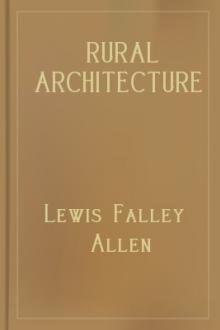Rural Architecture - Lewis Falley Allen (books recommended by bts TXT) 📗

- Author: Lewis Falley Allen
- Performer: -
Book online «Rural Architecture - Lewis Falley Allen (books recommended by bts TXT) 📗». Author Lewis Falley Allen
We say that we love dogs: not all dogs, however. But we love some dogs—of the right breeds. There is probably no other civilized country so dog-ridden as this, both in
"Mongrel, puppy, whelp, and hound,
And curs of low degree."
Goldsmith, kind man that he was, must have been a capital judge of dogs, like many other poetical gentlemen. Still, other men than poets are sometimes good judges, and great lovers of dogs; but the mass of people are quite as well satisfied with one kind of dog as with another, so that it be a dog; and they too often indulge in their companionship, much to the annoyance of good neighborhood, good morals, and, indeed, of propriety, thrift, and common justice. Of all these we have nothing to say—here, at least. Ours is a "free country"—for dogs, if for nothing else. Nor shall we discuss the various qualities, or the different breeds of dogs for sporting purposes. We never go out shooting; nor do we take a hunt—having no taste that way. Perhaps in this we are to be pitied; but we are content as it is. Therefore we shall let the hounds, and pointers, and setters, the springers, and the land and the water spaniels, all alone. The mastiffs, and the bull dogs, too, we shall leave to those who like them. The poodle, and the little lap-dog of other kinds, also, we shall turn over to the kindness of those who—we are sorry for them, in having nothing better to interest themselves about—take a pleasure in keeping and tending them.
We want to mix in a little usefulness, as well as amusement, in the way of a dog; and after a whole life, thus far, of dog companionship, and the trial of pretty much every thing in the line of a dog—from the great Newfoundland, of a hundred pounds weight, down to the squeaking little whiffet, of six—we have, for many years past, settled down into the practical belief that the small ratting terrier is the only one, except the shepherd dog, we care to keep; and of these, chiefly, we shall speak.
There are many varieties of the Terrier. Some are large, weighing forty or fifty pounds, rough-haired, and savage looking. There is the bull-terrier, of less size, not a kindly, well-disposed creature to strangers; but irascibly inclined, and unamiable in his deportment; still useful as a watch-dog, and a determined enemy to all vermin, whatever. Then, again, are the small rat-terriers, as they are termed, weighing from a dozen to twenty pounds; some with rough, long, wiry hair; a fierce, whiskered muzzle; of prodigious strength for their size; wonderful instinct and sagacity; kind in temper; and possessing valuable qualities, bating a lack of beauty in appearance. They are of all colors, but are generally uniform in their color, whatever it be. Another kind, still, is the smooth terrier, of the same sizes as the last; a very pretty dog indeed; with a kinder disposition to mankind; yet equally destructive to vermin, and watchful to the premises which they inhabit, or of whatever else is put under their charge. The fidelity of the terrier to his master is wonderful; equal, if not superior to any other dog whatever. In courage and perseverance, in hardihood, and feats of daring, he has hardly an equal; and in general usefulness, no dog can compare with him.
THE SMOOTH TERRIER.
Sir Walter Scott, who was a great friend to dogs, as well as a nice and critical judge of their qualities, used to tell this story:—When a young man, first attending, as an advocate, the Jedburgh assizes, a notorious burglar engaged Sir Walter to defend him on his trial for housebreaking in the neighborhood. The case was a hard one; the proof direct and conclusive; and no ingenuity of the defence could avoid the conviction of the culprit. The matter was settled beyond redemption; and before he left for his imprisonment, or transportation, the thief requested Sir Walter to come into his cell. On meeting, the fellow frankly told his counsel that he felt very grateful to him for his efforts to clear him; that he had done the best he could; but the proof was too palpable against him. He would gladly reward Sir Walter for his services; but he had no money, and could only give him a piece of advice, which might, perhaps, be serviceable hereafter. Sir Walter heard him, no doubt, with some regret at losing his fee; but concluding to hear what he had to say. "You are a housekeeper, Mr. Scott. For security to your doors, use nothing but a common lock—if rusty and old, no matter; they are quite as hard to pick as any others. (Neither Chubbs' nor Hobbs' non-pickable locks were then invented.) Then provide yourself with a small rat terrier, and keep him in your house at night. There is no safety in a mastiff, or bull-dog, or in a large dog of any breed. They can always be appeased and quieted, and burglars understand them; but a terrier can neither be terrified nor silenced; nor do we attempt to break in where one is known to be kept." Sir Walter heeded the advice, and, in his housekeeping experience, afterward, confirmed the good qualities of the terrier, as related to him by the burglar. He also commemorated the conversation by the following not exceedingly poetical couplet:
"A terrier dog and a rusty key,
Was Walter Scott's first Jedburgh fee."
The terrier has a perfect, thorough, unappeasable instinct for, and hatred to all kinds of vermin. He takes to rats and mice as naturally as a cat. He will scent out their haunts and burrows. He will lie for hours by their places of passage, and point them with the sagacity of a pointer at a bird. He is as quick as lightning, in pouncing upon them, when in sight, and rarely misses them when he springs. A single bite settles the matter; and where there are several rats found together, a dog will frequently dispatch half a dozen of them, before they can get twenty feet from him. A dog of our own has killed that number, before they could get across the stable floor. In the grain field, with the harvesters, a terrier will catch hundreds of field-mice in a day; or, in the hay field, he is equally destructive. With a woodchuck, a raccoon, or anything of their size—even a skunk, which many dogs avoid—he engages, with the same readiness that he will a rat. The night is no bar to his vigils. He has the sight of an owl, in the dark. Minks, and weasels, are his aversion, as much as other vermin. He will follow the first into the water, till he exhausts him with diving, and overtakes him in swimming. He is a hunter, too. He will tree a squirrel, or a raccoon, as readily as the best of sporting dogs. He will catch, and hold a pig, or anything not too large or heavy for him. He will lie down on your garment, and watch it for hours; or by anything else left in his charge. He will play with the children, and share their sports as joyfully as a dumb creature can do; and nothing can be more affectionate, kind, and gentle among them. He is cleanly, honest, and seldom addicted to tricks of any kind.
We prefer the high-bred, smooth, English terrier, to any other variety. They are rather more gentle in temper, and very much handsomer in appearance, than the rough-haired kind; but perhaps no better in their useful qualities. We have kept them for years; we keep them now; and no reasonable inducement would let us part with them. A year or two ago, having accidentally lost our farm terrier, and nothing remaining on the place but our shepherd dog, the buildings soon swarmed with rats. They were in, and about everything. During the winter, the men who tended the horses, and cattle, at their nightly rounds of inspection, before going to bed, would kill, with their clubs, three or four, in the barns and stables, every evening. But still the rats increased, and they became unendurable. They got into the grain-mows, where they burrowed, and brought forth with a fecundity second only to the frogs of Egypt. They gnawed into the granaries. They dug into the dairy. They entered the meat barrels. They carried off the eggs from the hen-nests. They stole away, and devoured, the young ducks, and chickens. They literally came into the "kneading troughs" of the kitchen. Oh! the rats were intolerable! Traps were no use. Arsenic was innocuous—they wouldn't touch it. Opportunity favored us, and we got two high-bred, smooth, English terriers—a dog, and a slut. Then commenced such a slaughter as we seldom see. The rats had got bold. The dogs caught them daily by dozens, as they came out from their haunts, fearless of evil, as before. As they grew more shy, their holes were watched, and every morning dead rats were found about the premises. The dogs, during the day, pointed out their holes. Planks were removed, nests were found, and the rats, young and old, killed, instanter. Hundreds on hundreds were slaughtered, in the first few weeks; and in a short time, the place was mostly rid of them, until enough only are left to keep the dogs "in play," and to show that in spite of all precaution, they will harbor wherever there is a thing to eat, and a possible place of covert for them to burrow.
To have the terrier in full perfection, it is important that the breed be pure. We are so prone to mix up everything we get, in this country, that it is sometimes difficult to get anything exactly as it should be; but a little care will provide us, in this particular. He should be properly trained, too, when young. That is, to mind what is said to him. His intelligence will be equal to all your wants in the dog-line; but he should not be fooled with. His instincts are sure. And, with a good education, the terrier will prove all you need in a farm, and a watch-dog. We speak from long experience, and observation.
THE SHEPHERD DOG.
The shepherd dog is another useful—almost indispensable—creature, on the sheep, or dairy farm. This cut is an accurate representation of the finest of the breed. To the flock-master, he saves a world of labor, in driving and gathering the flocks together, or from one field, or place, to another. To the sheep-drover, also, he is worth a man, at least; and in many cases, can do with a flock what a man can not do. But for this labor, he requires training, and a strict, thorough education, by those who know how to do it. He is a peaceable, quiet creature; good for little else than driving, and on a stock farm will save fifty times his cost and keeping, every year. He is a reasonably good watch-dog, also; but he has neither the instinct, nor sagacity of the terrier, in that duty. To keep him in his best estate, for his own peculiar work, he should not be troubled with other labors, as it distracts his attention from his peculiar duties. We had a remarkably good dog, of this kind, a few years since. He was worth the services of a stout boy, in bringing up the cattle, and sheep, until an idle boy or two, in the neighborhood, decoyed him out in "cooning," a few nights during one autumn—in which he proved a most capital hunter; and after that, he became worthless, as a





Comments (0)